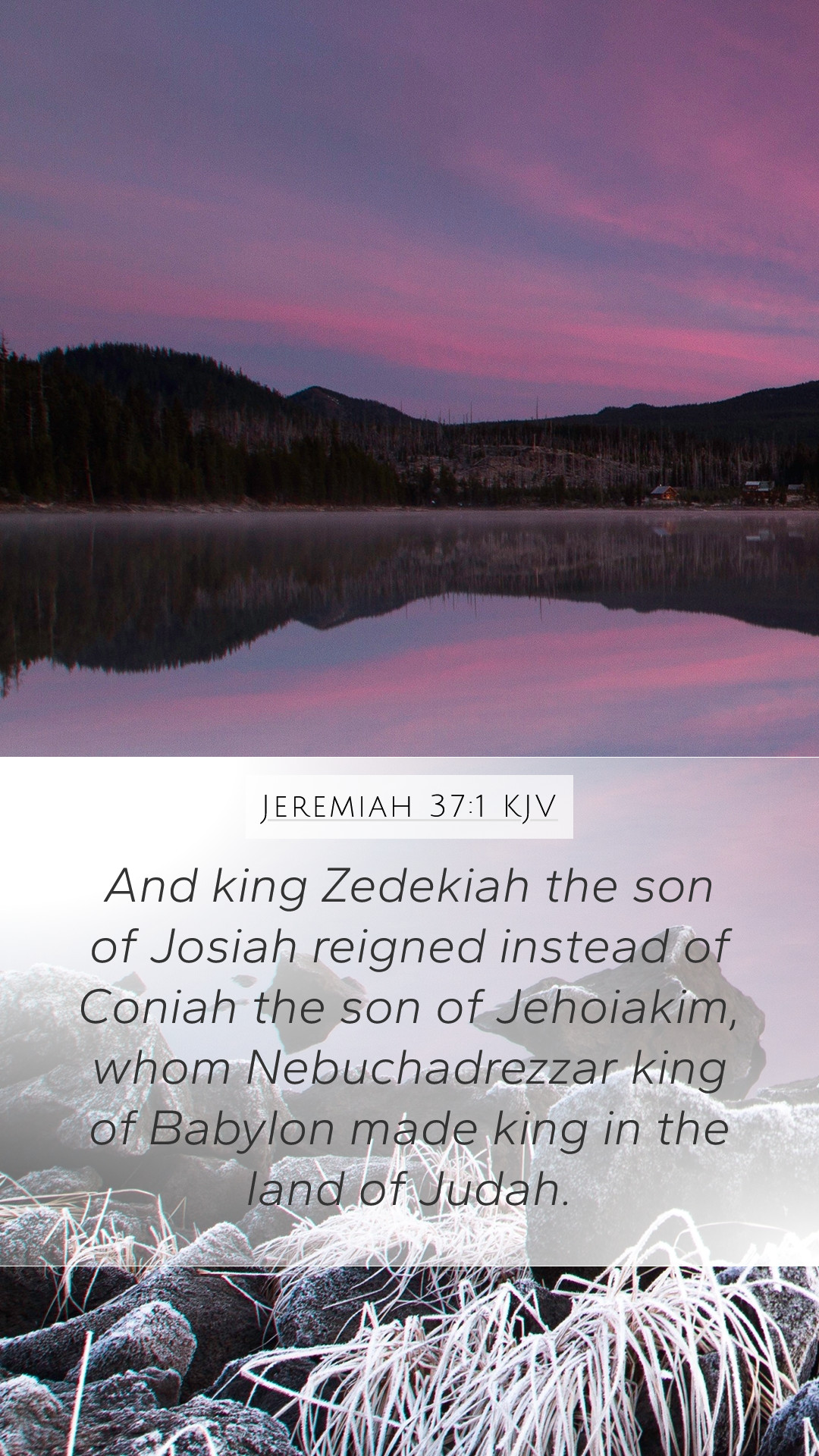Bible Verse Commentary: Jeremiah 37:1
Verse: "And king Zedekiah the son of Josiah reigned instead of Coniah the son of Jehoiakim, whom Nebuchadnezzar king of Babylon made king in the land of Judah."
Overview
Jeremiah 37:1 introduces King Zedekiah's reign, a time marked by political turmoil and prophetic warnings. This verse sets the stage for deeper reflection on the nature of authority and divine sovereignty during the Babylonian exile.
Context and Significance
This verse is pivotal as it notes that Zedekiah, whose name means "the Lord is righteous," was appointed king. This appointment came amid significant geopolitical shifts as Nebuchadnezzar's power rose. The characters involved—Zedekiah, Jehoiakim, and Coniah (also known as Jeconiah)—illustrate the struggles within Judah's monarchy under Babylonian rule.
Historical Context
Understanding the historical backdrop is essential for a comprehensive interpretation of this verse. Zedekiah's rule (597-586 B.C.) followed Jeconiah's exile and was marked by continued rebellion against Babylon. His leadership faced severe challenges as external threats loomed and internal divisions plagued the kingdom.
Biblical Exegesis
- Authority and Sovereignty: This verse highlights the sovereignty of God, emphasizing that although kings may rise or fall by earthly political measures, it is ultimately divine will that directs the course of history.
- Judah's Fate: Zedekiah’s kingship reflects the struggle between obedience to God and the human inclination to seek power apart from divine direction. His choices, shaped by fear of Babylon and internal discontent, reveal the precarious position of Judah during this era.
Interpretations from Commentaries
Insights from notable public domain commentaries provide richer understanding:
Matthew Henry's Commentary
Henry states that Zedekiah's appointment by Nebuchadnezzar signifies not only the loss of autonomy for Judah but also highlights the prophetic nature of Jeremiah’s messages. This verse underlines the importance of acknowledging God's sovereignty even amidst dire circumstances.
Albert Barnes' Notes
Barnes emphasizes the precarious nature of Zedekiah’s position, noting the tension between his role as king and the overarching Babylonian authority. He interprets this verse as a reminder of the futility of rebellion against divine will, given Zedekiah's eventual demise as described in later chapters.
Adam Clarke's Commentary
Clarke reflects on the significance of Zedekiah's lineage and his failures as a ruler. The verse serves as a prelude to Zedekiah's attempts to align himself with various factions rather than trusting in God's guidance—a reflection of the broader spiritual condition of Judah at that time.
Bible Study Insights
For those engaging in Bible study groups or looking for Bible study tools, reflecting on Jeremiah 37:1 can offer profound lessons in the following ways:
- Application of Scripture: Recognize the importance of pursuing God’s will rather than succumbing to worldly pressures and alliances.
- Understanding Difficult Passages: Grasp the significance of historical context in interpreting scripture, especially in prophetic texts.
- Online Bible Study: Utilize resources that allow a deeper exploration into the themes of authority, rebellion, and divine oversight as reflected in Jeremiah.
Related Bible Verses
Additional Bible cross references that enhance the understanding of Jeremiah 37:1 include:
- 2 Kings 24:17-20: Details the political upheaval leading to Zedekiah’s reign.
- Jeremiah 22:24-30: Prophecies regarding Jeconiah and implications for the future of Judah.
- Ezekiel 17:12-21: Symbolic representation of Zedekiah's loyalty and rebellion against Babylon.
Conclusion
Jeremiah 37:1 serves as a critical lens through which to view the interplay between divine providence and human authority. For anyone seeking Bible verse meanings and Bible verse interpretations, this verse invites reflection on how we can apply the lessons of trust and obedience to our contemporary lives.
Through thorough scripture analysis and biblical exegesis, believers and scholars can uncover rich theological insights applicable to today’s context, reminding us of the enduring relevance of the scriptures.


